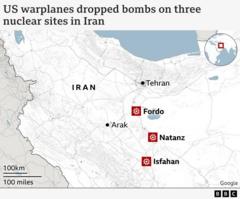How Will Iran Respond to the US Shifting the Conflict's Course?

Understanding the Israeli-Iranian Conflict: A New Chapter Unfolds
As tensions rise in the Middle East, the recent developments in the Israeli-Iranian conflict have captured global attention. The events of a single morning have the potential to reshape geopolitical landscapes and alter the course of history. This article delves into the implications of Israel's military actions against Iran, the responses from various stakeholders, and what the future might hold for this turbulent region. With a focus on the motivations behind these actions and their potential consequences, we aim to present a comprehensive overview of this complex situation.
The Historical Context of the Israeli-Iranian Tensions
The relationship between Israel and Iran has been fraught with animosity for decades, rooted in deep-seated ideological differences, territorial disputes, and historical grievances. Following the Islamic Revolution of 1979, Iran has positioned itself as a staunch opponent of Israel, frequently calling for its destruction. This ideology has fueled a range of proxy conflicts throughout the region, with Iran supporting various militant groups hostile to Israel.
Israel, on its part, has perceived Iran's nuclear ambitions as an existential threat. Over the years, Israeli leaders have consistently warned that a nuclear-armed Iran would lead to catastrophic consequences not just for Israel, but for the entire Middle East. This perception has fueled a series of military operations aimed at curtailing Iran's nuclear capabilities and military influence.
Netanyahu's Strategic Moves
Benjamin Netanyahu, Israel's longest-serving prime minister, has been relentless in his pursuit of a military solution to the Iranian threat. His recent address, delivered in English to emphasize its significance to an international audience, highlighted his reliance on U.S. support to achieve these aims. For Netanyahu, the bombing of Iranian nuclear sites represents a pivotal moment in his ongoing campaign against Iran.
Netanyahu's strategy has long relied on persuading the United States to take a more aggressive stance against Iran. By framing Iran's nuclear program as an imminent threat, he has successfully garnered support for military action, even from administrations that have traditionally favored diplomatic solutions. Recent events have shown that Netanyahu's efforts have not been in vain, as President Trump's decision to bomb Iranian nuclear sites marks a significant shift in U.S. foreign policy.
The Role of the United States
The United States has historically played a crucial role in the Middle East, acting as a counterbalance to Iranian influence. Trump's administration, despite its initial reluctance to engage in overseas military conflicts, has taken a bold stance in response to Netanyahu's calls for action. This dynamic has raised questions about the extent of U.S. involvement in the region and the potential for escalation.
While Netanyahu celebrates the bombing of Iranian sites as a victory, it's essential to recognize the complexities involved. Trump's decision came in the face of intelligence assessments that did not fully align with Israeli claims about the immediacy of the Iranian nuclear threat. This divergence highlights the challenges of relying on military solutions in a landscape characterized by nuanced and multifaceted threats.
The Immediate Aftermath of the Bombing
The bombing of Iranian nuclear sites has sent shockwaves through the region. For Netanyahu, it signifies a potential turning point in the conflict, one that could allow him to declare a partial victory. However, Iran's swift response—claiming to have relocated its nuclear materials—suggests that the situation remains fluid and precarious.
In the immediate aftermath, the Iranian leadership has vowed to retaliate. Ayatollah Ali Khamenei's warning of "irreparable damage" to U.S. interests emphasizes the potential for escalation. As tensions mount, both sides must navigate a complex web of regional alliances and rivalries, each with its own agendas and motivations.
Potential Responses from Iran
Iran has a range of options at its disposal for responding to the bombing. These could include:
- Proxy Warfare: Iran has historically employed proxy groups throughout the region, such as Hezbollah in Lebanon and various militias in Iraq and Syria. These groups could launch attacks against U.S. interests or allied forces.
- Direct Military Action: While riskier, Iran could choose to strike directly at U.S. military installations in the Gulf, which could lead to significant casualties and further escalation.
- Cyber Warfare: Iran has developed capabilities in cyber warfare, which could be employed to disrupt U.S. infrastructure or military operations without provoking a direct military response.
- Economic Retaliation: Iran could threaten to disrupt oil shipments through the Strait of Hormuz, a vital trade route, potentially leading to spikes in oil prices and economic repercussions for the global market.
The Broader Implications for the Middle East
The fallout from these events will undoubtedly have far-reaching implications for the Middle East. The immediate balance of power could shift, affecting not only Israel and Iran but also neighboring countries and global powers. The potential for a broader conflict looms large, as other regional actors may choose to intervene or exploit the situation for their own interests.
Additionally, the economic ramifications of military action in the region cannot be understated. Disruptions in oil supply, coupled with the uncertainty of military engagements, could lead to increased volatility in global oil markets. Countries heavily dependent on oil exports may face economic challenges, further complicating regional dynamics.
Impact on U.S. Foreign Policy
The recent escalation highlights the delicate balance the U.S. must maintain in its foreign policy towards the Middle East. Trump's administration has signaled a preference for limited engagement, but the bombing of Iranian sites raises questions about the long-term strategy. Will the U.S. continue to support Israel's military actions, or will it seek a diplomatic resolution to the conflict?
As the situation evolves, the U.S. must navigate its relationships with both Iran and Israel, balancing its strategic interests with the potential for unintended consequences. The response from Iran and its allies will be crucial in determining whether this marks a turning point towards peace or a descent into further conflict.
The Path Forward: Seeking Diplomacy Amidst Tensions
In the wake of recent events, the urgent need for diplomatic solutions becomes apparent. While military actions may provide short-term results, they often fail to address the underlying issues fueling the conflict. Both Israel and Iran must recognize the importance of dialogue and negotiation to prevent further escalation and promote stability in the region.
International stakeholders, including the United Nations and other influential nations, can play a pivotal role in facilitating discussions aimed at de-escalation. Establishing communication channels between the conflicting parties may help build trust and pave the way for a more peaceful resolution.
The Role of Regional Powers
Regional powers, such as Saudi Arabia, Turkey, and Egypt, also have a stake in the outcome of the Israeli-Iranian conflict. Their involvement could help mediate discussions and provide a broader framework for peace. Collaborative efforts among these nations may contribute to stabilizing the Middle East and reducing the likelihood of further military confrontations.
Conclusion: A Fork in the Road
The current state of the Israeli-Iranian conflict represents a critical juncture in Middle Eastern history. The actions taken by both Israel and Iran will reverberate for years to come, shaping the geopolitical landscape and influencing the lives of millions. The challenge ahead lies in navigating the complexities of this conflict and striving for a peaceful resolution that addresses the concerns of all parties involved.
As we reflect on the events unfolding in the region, we must ask ourselves: Will the desire for peace prevail amidst the clamor for military might, or are we witnessing the beginning of an even more tumultuous phase in the Middle East? The answer may redefine our understanding of security and diplomacy in the years to come.
FAQs
What triggered the recent escalation between Israel and Iran?
The escalation was triggered by Israel's bombing of Iranian nuclear sites, a move that was supported by the U.S. under President Trump. This military action was framed as a necessary step to neutralize the perceived threat posed by Iran's nuclear ambitions.
How has the international community responded to the conflict?
The international community has expressed concern over the potential for further escalation in the region. Calls for diplomacy and negotiation have been made, but responses vary among nations, reflecting differing interests and alliances.
What are the potential consequences of the bombing on U.S.-Iran relations?
The bombing of Iranian sites could strain U.S.-Iran relations further, leading to increased hostility and potential retaliation from Iran. The long-term implications on diplomatic relations will depend on how both nations choose to respond in the coming weeks.
As this situation evolves, what steps do you think should be taken to promote peace in the Middle East? #MiddleEastPeace #Geopolitics #IranIsraelConflict
Published: 2025-06-22 05:03:06 | Category: technology



